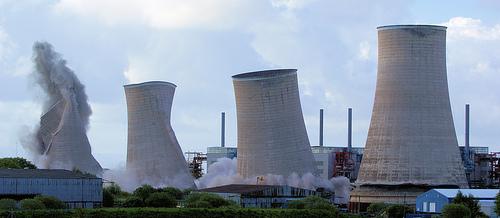
The Scottish Government say they agree that 'the negative consequences of nuclear power far outweigh the reasons for its continued existence, and further more, that there is not an energy gap that only nuclear can fill'. The assurance comes in a response from the Energy Directorate to a query from the Celtic League after announcements by the Westminster government which suggest 'new build' nuclear power stations are to be given the green light.
The Scottish Government say they agree that \'the negative consequences of nuclear power far outweigh the reasons for its continued existence, and further more, that there is not an energy gap that only nuclear can fill\' (see below). The assurance comes in a response from the Energy Directorate to a query from the Celtic League after announcements by the Westminster government which suggest \'new build\' nuclear power stations are to be given the green light.
\"Enterprise, Energy and Tourism Directorate The Scottish Government
2nd March 2008
Dear Mr Tal-e-bot
Thank you for your letter of 21st January 2008, addressed to Jim Mather MSP, the Minister for Enterprise and Tourism, about the Celtic League\'s position on nuclear power. As one of the officers within the Scottish Government with responsibility for energy matters, including nuclear power, I have been asked to reply.
Ministers are always keen to hear views on their policies, no matter the issue, or indeed the viewpoint. I know that your supportive comments regarding the Scottish Government\'s policy on nuclear power stations will be welcomed by the First Minister and his Ministerial colleagues.
In regard to your first question as to whether the Scottish Government\'s opposition extends to existing power stations, I should clarify that once a nuclear power station becomes operational , the decision when it will cease operation is a matter for the power station operator and the Nuclear Installations Inspectorate, and not the Government.
We understand that the decision is based on whether the plant can remain safely operational, while remaining economically viable.
You may be interested to know that Scotland has only two operational power stations. These are Hunterston B, in North Ayrshire, and Torness, in East Lothian. The decommissioning dates for these stations are 2016 and 2023 respectively. The nuclear research facility at Dounreay in Caithness and the nuclear power stations at Chapelcross in Dumfries and Galloway; and Hunterston A (adjacent to Hunterston B in North Ayrshire), are no longer operational and are currently being decommissioned.
In response to your second question, I should make it clear that proposals to develop new power stations, including nuclear power, would come from the energy industry and not from the UK or Scottish Government\'s. The role of the Scottish Ministers is solely to consider whether to grant consent for any proposal for a new power station, submitted to them under Section 36 of the Electricity Act 1989.
Scottish Ministers would of course consider any application submitted to them by the industry on its individual merits. However, given our energy policy position, combined with Scotland\'s current generating capacity and abundant energy sources, it is unlikely such a proposal would find favour with Scottish Ministers.
Scotland has a strong comparative advantage in clean, green sources of energy. The Scottish Government is determined to make the most of this potential by supporting the development of as wide a range as possible of renewable technologies, including on and offshore wind, biomass and marine energy. This recognises the environmental and economic benefits as well as the more secure supplies of energy that such a diverse range of sources can provide.
On your question about the closure of Sellafield, you may wish to know that operational issues for Sellafield are reserved to the UK Government. Nevertheless, the Scottish Government recognises the important part Sellafield plays in the clean up of the UK legacy of radioactive waste, including sites in Scotland. We recognise that certain operations at Sellafield need to be continued for some time as part of the integrated, programmed disposal of radioactive waste, spent fuel and nuclear materials from sites throughout the UK, again including sites in Scotland.
The Scottish Government agrees that the negative consequences of nuclear power far outweigh the reasons for its continued existence, and further more, that there is not an energy gap that only nuclear can fill. In fact, according to UK Government statistics, published in January 2008, over 92% of Scotland\'s electricity consumption was met by sources other than nuclear power in 2006. At the same time Scotland was still able to export 20% of its generation to England and Northern Ireland.
On your final point, the Scottish Government is keen to exploit Scotland\'s geological and geographical advantages and make full use of Scotland\'s abundance of alternative energy sources. These sources include renewable generation from on and offshore wind, hydro electric power, as well as power from hydrocarbons such as coal and oil supplies. We have a strong commitment to developing renewable sources by 2020, and there is ongoing work on a renewable heat strategy. Through the development of new technology, including carbon capture and storage, these energy sources can give us an alternative low carbon future.
I trust this information is useful.\"
Related article on Celtic News at:
http://groups.yahoo.com/group/celtic_league/message/2349 http://groups.yahoo.com/group/celtic_league/message/2347J B Moffatt Director of Information Celtic League
14/03/08

Commentaires (0)
Aucun commentaire pour le moment. Soyez le premier à réagir !